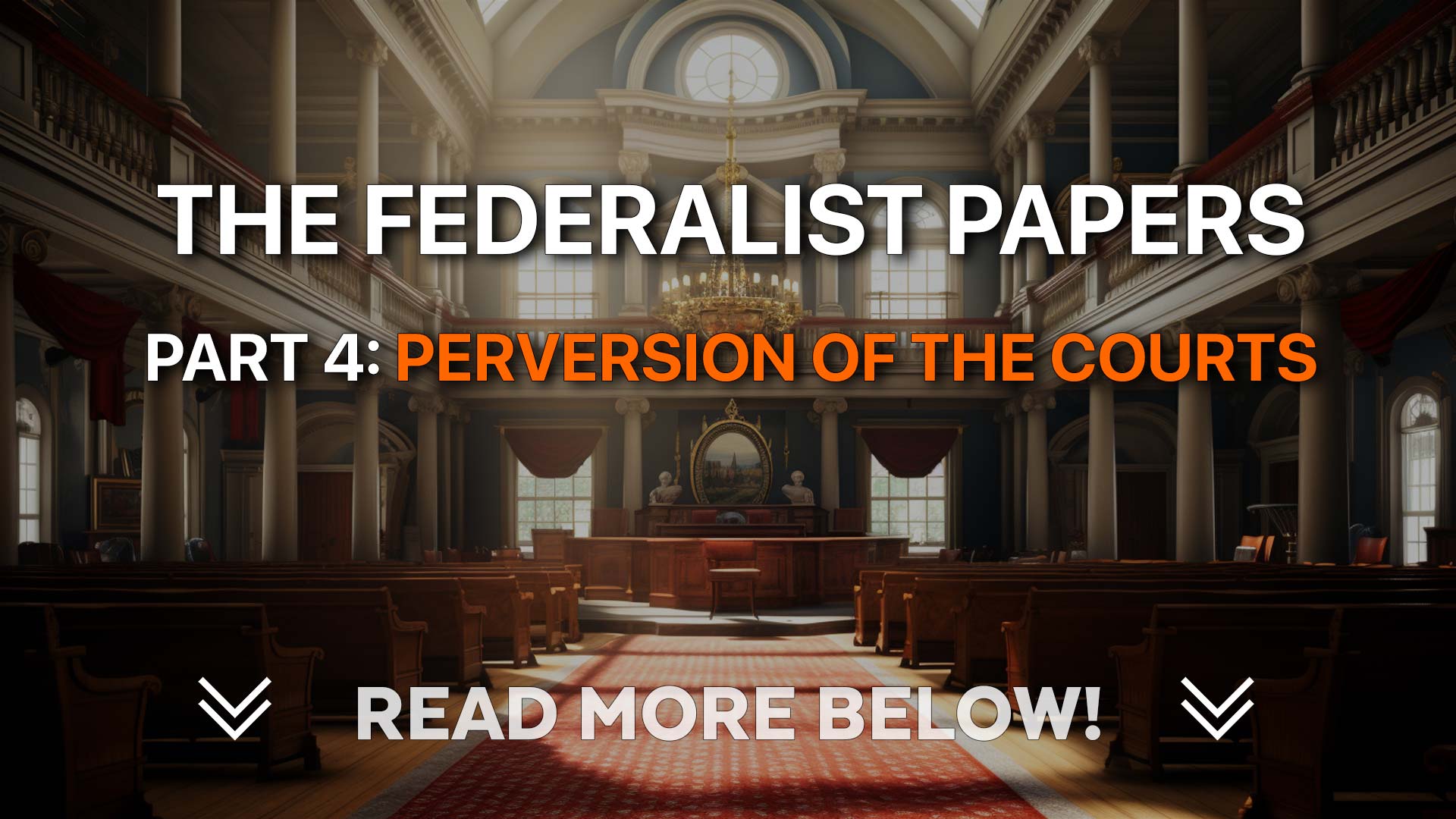Our founders were smart guys. They knew all about oligarchies and tyrants and feared that courts could be some of the worst atrocities on their people.
With no term limits, no elections, and little accountability, they had great fears. They saw how across the pond, if you had a bad judge, you could have a very bad life.
So when they created our system of government, they didn’t want us subjected to men; they wanted us subjected to the law. In essence, a land governed by laws, not men.
Today, we see how their fears have come true, with courts telling us what we must put in our bodies or saving us from putting things in our bodies, to wearing harmful face diapers, to not wearing them, to taking our guns away, to giving them back, to covering up our election frauds and election thefts, and hopefully doing the right thing and exposing the issues.
The courts have tremendous powers. The founders were so against attorneys that they actually put in the original 13th amendment that no attorney could serve in the legislature. Additionally, there is no requirement to be an attorney to be a federal judge, or a Supreme Court justice!
The founders’ greatest fears were the perversion and sophistry of the courts. The laws should be written clearly and concisely so all understand. Judges should rule based on the written law, not try to interpret what might have been going through the legislators’ heads at the moment they signed it.
The problem with judges and attorneys who like to say the “intent” of the law means “x” even though it says “z” is these people are dangerous. Firstly, they have no business speculating; second, they have no idea what quid pro quo happened to get the law passed as written; and third, what was written then is not meant to signify something different today than it was then.
People who believe in a fluid and living constitution are very dangerous as they bend it to whatever they wish, versus having the people petition the legislature to make an amendment or change the law. These judges try to play all 3 branches of government and have no business in government. They have no business as judges, period.
They need to follow the law and rule by what it says, not what they wish it said or make some nonsense up altogether. Courts have the power to be our saviors or enslavers. It’s a terrifying notion, and most people have no idea what’s going on.
In Nevada, for instance, the Supreme Court made it so you can’t recall State Judges. Imagine that! Judges making more rules for judges so they are no longer accountable to the people. It’s our founders’ fears coming to life again.
Luckily, we have the ability to elect state judges. Unluckily for us, our elections are rigged. Luckily for us, we are suing in numerous arenas, and if some of these judges do the right thing, they have the power to save the country. Time will soon tell which side of history these people will be on.
In the meantime, here is what our founders had to say about our courts, judges, their fears, and warnings:
Federalist Paper No. 78 by Alexander Hamilton
“The judiciary is the least dangerous branch of power because it has neither the sword nor the purse.”
“The judiciary will always be the least dangerous to the political rights of the Constitution, because it will be least in a capacity to annoy or injure them.”
“The judiciary is beyond comparison the weakest of the three departments of power. But it may be in some sort the keystone that makes the whole arch stand.”
Federalist Paper No. 51 by James Madison
“If men were angels, no government would be necessary. If angels were to govern men, neither external nor internal controls on government would be necessary.”
Federalist No. 81 by Alexander Hamilton
“It may in the last place be observed that the supposed danger of judiciary encroachments on the legislative authority, which has been upon many occasions reiterated, is in reality a phantom.”
Federalist No. 10 by James Madison
“It is in vain to say that enlightened statesmen will be able to adjust these clashing interests, and render them all subservient to the public good.”
Federalist No. 48 by James Madison
“Will it be sufficient to mark, with precision, the boundaries of these departments, in the constitution of the government, and to trust to these parchment barriers against the encroaching spirit of power?”
Federalist No. 78 by Alexander Hamilton
“Though individual oppression may now and then proceed from the courts of justice, the general liberty of the people can never be endangered from that quarter; I mean so long as the judiciary remains truly distinct from both the legislature and the Executive.”
Thomas Jefferson:
“Our judges are as honest as other men and not more so. They have with others the same passions for party, for power, and the privilege of their corps.”
Letter to John Tyler (26 May 1810)
James Madison:
“As the courts are generally the last in making the decision, it results to them, by refusing or not refusing to execute a law, to stamp it with its final character. This makes the Judiciary department paramount in fact to the Legislature, which was never intended and can never be proper.”
Letter to James Monroe (13 Sept. 1784)
Thomas Jefferson:
“You seem … to consider the judges as the ultimate arbiters of all constitutional questions; a very dangerous doctrine indeed, and one which would place us under the despotism of an oligarchy. Our judges are as honest as other men, and not more so.”
Letter to William Charles Jarvis (28 Sept. 1820)
John Adams:
“It is more important that innocence should be protected, than it is, that guilt be punished; for guilt and crimes are so frequent in this world, that all of them cannot be punished… When innocence itself, is brought to the bar and condemned, especially to die, the subject will exclaim, ‘it is immaterial to me whether I behave well or ill, for virtue itself is no security.’ And if such a sentiment as this were to take hold in the mind of the subject that would be the end of all security whatsoever.”
1770 Boston Massacre Trials
Thomas Jefferson:
“The great object of my fear is the federal judiciary. That body, like gravity, ever acting, with noiseless foot, and unalarming advance, gaining ground step by step, and holding what it gains, is engulfing insidiously the special governments into the jaws of that which feeds them.”
Letter to Judge Spencer Roane (9 March 1821)
Ben Franklin:
“Justice will not be served until those who are unaffected by injustice are as outraged as those who are.”
I have always been wary of the courts. While they undeniably hold the potential to be a force for immense good in society, they can also be weaponized to oppress the people and subvert true justice. The most immediate danger is the sway of powerful interests. Often, the affluent and well-connected, backed by the best attorneys and lobbyists, can tilt the courts in their favor, casting a shadow over the ideal that justice should be blind. Instead, it risks becoming a commodity, with verdicts bought and sold to the highest bidder.
Moreover, there’s the looming danger of courts interpreting laws in manners that diverge from the people’s will. This typically emerges when judges, appointed by politicians with agendas misaligned with the majority’s values, put their own spin on legal interpretations. These deviations can not only distort justice but, in more pronounced cases, even delay or deny it. Lengthy legal proceedings and rulings that set convoluted paths for justice seekers are manifestations of such hazards.
The necessity of the courts arises from the simple truth that men, inherently flawed, are not angels. Prone to corruption and the temptations of unchecked power, human systems need the judiciary to serve as a safeguard, checking governmental power and upholding the rights of its citizens. But herein lies another challenge: ensuring the courts themselves remain under scrutiny. They must operate under the unwavering rule of law and consistently reflect the will of the people.
Courts are pivotal in balancing the might of the other government branches. They stand as guardians of minority rights and are the vanguard ensuring that laws are dispensed fairly. Yet, the duality of their power is that it can be a force for good or become an instrument of evil. This underscores the imperative to ensure our courts are helmed by judges epitomizing honesty, fairness, and competence.
The overarching belief I hold is that the power of the courts, while indispensable, must be judiciously controlled. A judiciary with unchecked might poses a palpable threat to the very liberty it vows to protect. The courts, brimming with power, open the gates for potential misuse. Attorneys, with their vast reservoirs of legal knowledge and skills, stand at a crossroads: they can steer justice’s course or deviate it for personal agendas. Thus, the onus falls upon every citizen to remain vigilant, warding off any attempts to tip the scales of justice through cunning or sophistry.
Beadles
P.S.
In New York, there is a judge who seemingly disregards the Appellate Court’s decisions. This same judge is now presuming the role of a real estate appraiser, significantly undervaluing Mar-a-Lago to a mere fraction of its worth, all under the guise of “justice”. It’s against such forms of “justice” that we once fiercely sought our freedom. Such instances are glaringly evident in our courts. The time for silence has passed. We can no longer afford to assume that someone else will handle it, thinking there’s no need for personal intervention. It’s crucial to be proactive, to scrutinize each judicial ruling, and hold these judges accountable. We must peacefully challenge these overreaches, while simultaneously commending those who uphold our Constitution and genuinely represent the will of the people. It’s imperative to denounce the unjust and celebrate the just; the time for action is now.




